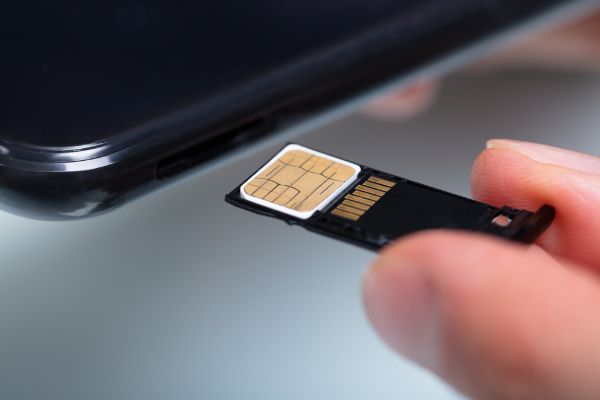Disclaimer: This post may contain affiliate links, meaning we get a small commission if you make a purchase through our links, at no cost to you. For more information, please visit our Disclaimer Page.
Ever since the invention of computers, developers and manufacturers have been finding ways to make them smaller and more portable. What started with computer banks that took up entire rooms has become a progression of desktop PCs, laptops, and even powerful computers within smartphones.
However, some people prefer using devices that are not as big as laptops or PCs but still give them larger screen space than an average smartphone. The tablet computer fills this gap nicely, allowing for a larger screen than a phone while still being portable and activated by touching or scrolling.
Because tablets are wireless devices, some users wonder about data plans for them. We’ll take you through some of the common questions associated with tablet data plans below.
Table of Contents
Do Tablets Use Data?
Tablets are wireless, handheld computers that you can take with you on the go. As we mentioned in the introduction, you can think of them as somewhat larger smartphones, although they might not be used mainly for calling in the way that phones are today.
However, besides all the other things tablets can do for you, there are some applications you can use to make calls. Because they have this ability, some people might wonder if tablets use data in the same way that phones might.
Tablets can use data, but they don’t normally come with data plans as standard parts of the package.
They differ somewhat from phones in this way. When you get a new smartphone or migrate your data, you’ll be asked what kind of data plan you might want for your phone.
Plans differ based on what various providers will offer, but they all allow their owners to make calls, gain internet access, and do other things even when they are away from typical Wi-Fi networks.
Because people need to make calls or do business outside of Wi-Fi range quite often, a mobile data plan is quite typical for phones. It might not be as usual for tablets, but you do have the option to pick up a data plan when you get a new device like this.
Whether you can or should gain a data plan with your tablet is something of a personal preference. However, it can also depend on how you plan to use the tablet, and that will become clearer as we move through the next sections below.
Tablets can use data, and there are situations where they might need it, but many people choose to operate these devices just when they are in Wi-Fi range alone.
Can I Use a Tablet Without a Data Plan?
The precise answer to this question really depends on how you plan to use the tablet. Suffice to say, yes, it is perfectly possible to use a tablet without a data plan if you so wish. If you only want to use your tablet within Wi-Fi range, it can be a serviceable device for you.
It is important to remember that the tablet is a wireless device, though, and you’ll need some kind of internet access in order to make full use of all of its capabilities.
Mostly, you can do this by using various Wi-Fi networks when they are available. Many apps should install the most recent versions onto your tablet once you download them.
Depending on how the app operates, you might be able to use it thereafter with no need for some kind of internet connection. Many users like to read or watch content on their tablets, with the larger screen making activities like this advantageous.
As long as you have the content stored on your tablet, it should be no problem to make use of it without a data plan.
In short, for any activities in which you don’t need to download something, it is easy to use a tablet without a data plan. You can even use some apps for offline work and other important business that you can save to the device and upload to a cloud service or other internet-based entity later on.
As long as you have occasional access to any kind of Wi-Fi network for uploading and downloading data when needed, you should get a lot of use out of your tablet.
Do You Need a Data Plan for a Tablet?
We’ve talked a bit about how a tablet can be serviceable without a data plan. However, this utility comes with a couple of assumptions. Namely, that you will be using your device mostly for offline viewing of content that doesn’t need an active internet connection, or that you’ll be within Wi-Fi range when you do need to transfer data.
If you’re performing duties that only need an occasional exchange of data once per day or so, just using whatever internet connection you have via your home Wi-Fi network should be fine. Public networks are also options at your disposal if you need a bit more access.
However, if you plan to use your tablet as a mobile workstation that needs a stream of uploads or downloads of information in order to get your work done, you may need a data plan for it. This goes back to what we touched on in the beginning about how your use case for the device would determine just how necessary a data plan might be for you.
Using the tablet as some kind of mobile workstation or entertainment center can cover a few different areas. We’ll give you some of the common reasons you might need a data plan for your tablet shortly.
Some users might wish to purchase at least an inexpensive, small data plan that they could pair with their tablets regardless of the circumstances. Even if you don’t think you’ll use the data much, it could be handy to have some attached to your tablet just in case.
That said, in most situations, you might be able to turn your smartphone into a mobile hotspot as a way to give your tablet access to data without a plan, too. There are a couple other considerations that might go along with this, and we will cover them in the relevant section.
4 Reasons You Would Need a Data Plan for Tablet
If you’re still not sure whether a data plan along with a tablet is the right option for you, we may be able to help clear up some of the confusion. This section will deal with some of the common use cases that some tablet owners might find that they want data for. There could be other reasons, but we’ll take you through some of the usual ones.
1. Working away from home.
These days, it is pretty common to have access to some kind of public Wi-Fi network to get data when you are not on your usual home network. However, if you need to do important work when you are away from home, you might not want to count on there always being Wi-Fi available for you to use. There are still plenty of areas that don’t have this kind of wireless service available.
Even if they do, Wi-Fi access or connectivity can be spotty, leading to frequent disruptions that might affect your work. A good data plan for a tablet could help you avoid this problem.
Furthermore, having access to a data plan can help you do work when you’re quite literally traveling through an area that doesn’t have Wi-Fi. Some public transport options have started offering Wi-Fi, but many of them still don’t have it available.
2. Working with sensitive material
This can also be a good reason to invest in a proper data plan. The increasing number of Wi-Fi networks available in most larger cities makes internet access convenient, but connecting to these networks comes with risks, too.
Most public Wi-Fi networks are perfectly fine, but some may not have adequate security protocols to ensure that your credentials or data are kept safe. If part of your job is to work with proprietary information, a tablet with LTE access may make more sense for you.
3. Keeping your connection stable
This is another thing to consider. If much of what you do is cloud-based, you could run into some problems with syncing if you step outside of Wi-Fi range before different apps are done uploading or downloading data.
In most cases, this may not be a big deal, but it is a problem that could lead to further issues for you down the road. If you know that you’ll have to go to areas that have unreliable Wi-Fi connections, a tablet that can pair with a good data plan is something to think about.
4. Tethering becomes unnecessary
This is true if you have a tablet that supports a data plan. While tethering your device to a hotspot can be a nice alternative to having access to a 4G network, it is not always the best option. This is due to how tethering might work with some mobile providers.
Not all plans or devices support tethering, and there might be restrictions or additional costs associated with it per your mobile agreement. If you’re at all unsure about these things, having mobile data may be the way to go.
Do I Need a SIM Card for a Tablet?
There are two main types of tablets that you’ll find on the market: Wi-Fi-only tablets are meant for offline use or connections only when a user is in Wi-Fi range. A tablet with network connectivity capabilities, which you might see listed as an LTE tablet or with 4G functionality, is the kind you would want if you need to be able to access the web when you’re not in range of a good Wi-Fi network.
If you are only interested in using a tablet for online capabilities when you are in Wi-Fi range, you don’t need a SIM card for it.
A tablet for Wi-Fi only use doesn’t need a SIM in order to function, and many of those models don’t even come with a slot to take a SIM card. For this reason, you don’t need to worry about a SIM card for tablets like these. You can think of a SIM card as a small chip that stores and manages mobile data over a cellular network.
Your smartphone has one, and your tablet will use one too, if you want it to be the kind that accesses the internet on its own. Further, you can use apps in conjunction with the SIM card to turn such a tablet into a larger device for making calls and related activities over a 4G network.
Bottom Line
Tablets are an excellent middle ground between relatively tiny smartphones and their much larger laptop cousins. As you can see, they can be great for offline work or entertainment just as much as they can be on-the-go workstations. There are many reasons why Wi-Fi only tablets should be suitable for most users. However, there are some instances where a tablet with its own 4G access could be extremely useful, too.


